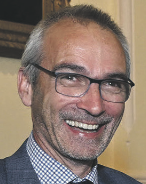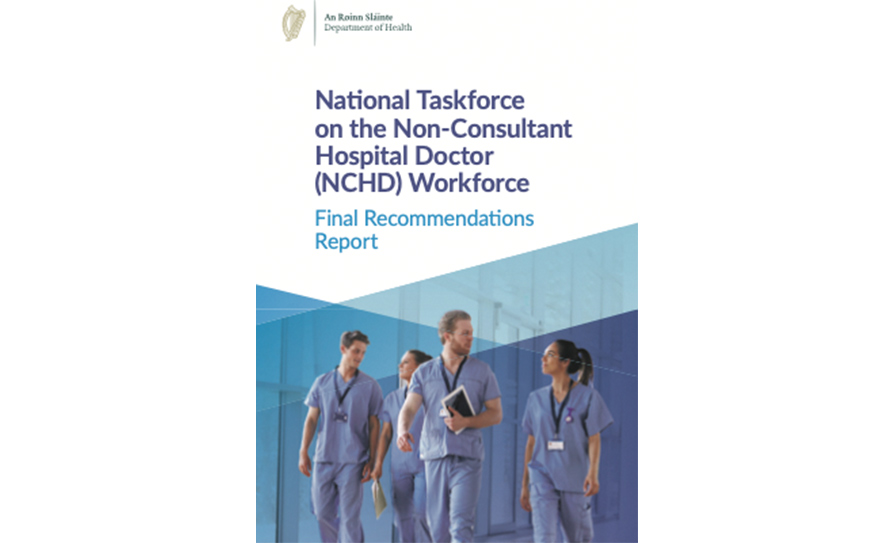Catherine Reilly examines what the final report of the national NCHD taskforce means for doctors
The Minister for Health’s announcement in September 2022 of a national NCHD taskforce came amid growing IMO agitation in relation to unsafe and illegal NCHD working hours.
The taskforce’s final report, published on 7 February, shares a similar backdrop. Late last year, following the HSE’s extension of the recruitment freeze to NCHD service posts, the IMO announced that NCHD members expected to call a ballot for industrial action in early 2024.

Dr Rachel McNamara
The recruitment embargo has exacerbated the sketchy implementation of the IMO/HSE/Department of Health NCHD agreement brokered in December 2022. In recent months, the IMO has revived the #Standingup4NCHDs messaging that accompanied its 2022 campaign. Perhaps the old saying that ‘nothing changes if nothing changes’ might be an even more appropriate new tagline.
On 5 February, in a post on the IMO’s NCHD Instagram page, NCHD committee Chair Dr Rachel McNamara said the Organisation would be conducting the “largest NCHD survey of all time” to identify the extent of contractual breaches nationally. An early finding was that 77 per cent of NCHDs reported routinely working over the maximum 48 hours per week as set down in the European Working Time Directive.
Genesis of taskforce
What was the purpose of the NCHD taskforce? Some may consider it was instigated by the Minister to ‘buy time’, particularly in the context of ongoing health service restructuring and budgetary pressures. A more benign view is that the final report has ultimately delivered a comprehensive set of recommendations endorsed at Ministerial level. The taskforce process has probably served both functions.
The positive intent of taskforce members, led by the Dean of the RCPI Institute of Medicine Prof Anthony O’Regan, is beyond doubt. Their final report (following an interim report in April 2023) captured most of the essential components required to enhance the employment and training experience for NCHDs in training and non-training posts.

Prof Anthony O’Regan
It includes recommendations to support prompt access to a fair and equitable roster which “encompasses HSE/IMO rostering rules”, the normalisation of flexible working and training options, and minimisation of cross-regional rotations during training, to mention just three key areas.
Overall, there are 44 recommendations with responsible leads and implementation timeframes (2026 for longer term recommendations).
But, it is also striking that the report largely sets out measures already encapsulated in other reports and documents. These include contractual agreements and the strategic framework for postgraduate medical education and training to 2030, which was published in 2021 by the Forum of Irish Postgraduate Medical Training Bodies (the Forum’s document referred to the need to develop a business case for targeted investment over the duration of the framework).
“It is critical that the recommendations of the NCHD taskforce are progressed as a matter of urgent priority,” stated Minister Stephen Donnelly upon the release of the final report. “It is also critical that the implementation of the recommendations is monitored on an ongoing basis to ensure that delivery of the desired improvements impacts positively on NCHD working and training.”
There was no detail in the Department’s press release on the level of multi-annual investment to support full implementation. According to the statement, the Minister had “given a commitment” that he would return to Government within four months with an “update on implementation including a costed implementation plan”.
Guarded welcome
The IMO issued a “guarded” welcome to the taskforce report. It noted the obvious need for an implementation plan with sufficient funding.
“The recommendations in this report go some way to addressing the issues faced by NCHDs today, but for any of us to have real confidence we need to see major investment and implementation to make those recommendations a reality,” stated Dr McNamara.
The IMO also expressed disappointment that certain key areas were “not addressed adequately”, including childcare arrangements for NCHDs (who routinely work nights and weekends); a medical workforce plan to match the aspirations of the report; and a realistic plan for the delivery of a best-in-class IT system to digitise the health service.
Dr McNamara said the taskforce’s plan was ambitious and that the IMO was prepared to work with the Department and the HSE. However, the current reality for NCHDs meant that building confidence and trust would be challenging.
In this regard, she referenced the impact of the recruitment freeze including staffing shortages and the need to cover for colleagues on sick leave or maternity leave; enormous expenses and disruption when rotating for training schemes every six months; and consistent contractual breaches.
Attrition
How urgent will the political system consider the recommendations of the taskforce report?
Last year, Medical Director of National Doctors Training and Planning (NDTP), Prof Brian Kinirons, told a medical training conference that NDTP research had shown 68 per cent of doctors who completed specialist training in 2016 were working in Irish healthcare (7 per cent in the private sector). However, 32 per cent were working abroad – predominantly in the UK – and there was a wide range of attrition depending on specialty. While Prof Kinirons was clearly challenging a view that Irish-trained doctors emigrated and never returned, he also conceded that an attrition rate of 32 per cent was unacceptable.
A new NDTP report notes a substantial improvement in retention of qualified specialists. It also outlines that working conditions have been highlighted as a key disincentive to returning to work in Ireland. “The intention to go abroad is also associated with a negative experience of mentoring which suggests that the quality of training and the way in which it is provided are important determinants of a doctor’s intention to remain in the Irish health system.”
The NDTP report also noted that half of interns leave the Irish health system after their internship, although the majority return to undertake training in Ireland a number of years later.
Department response
A Department spokesperson told the Medical Independent that €5 million was allocated to support the interim recommendations of the taskforce. “A further €5 million is being allocated to support implementation in 2024. Many of the recommendations contained in this final report will also be supported by funding allocated in Budget 2024 for minor capital improvements, ICT and increases in postgraduate training places and the clinical educator programme.”
The Department spokesperson also said there had been “significant increases” in the number of training places. “Approval was provided in Budget 2023 for additional intern and postgraduate medical training places, which included the establishment of 83 new postgraduate training posts. This measure supports medical workforce planning and the provision of additional doctors in specialist training programmes. This represents a target increase of 133 specialist training doctors in the health service in training programmes including the intern programme, general practice (GP), radiology, pathology, and public health medicine training programmes.”
Funding of €7.7 million was provided in Budget 2024 to allow for the expansion of SHO and specialist registrar posts to continue to increase GP and NCHD postgraduate training places. According to the Department, 105 new training posts will be established from July 2024, with a focus on the establishment of 94 SHO posts. “These posts will accommodate the expedited GP training expansion of the annual intake from 286 places in July 2023 to 350 places in July 2024.
The final report of the taskforce recommended that the Department establish a multi-stakeholder policy group for the purpose of defining benchmarks for medical safe staffing levels. According to the Department, “it is proposed that establishment of this group will be progressed in 2024.”
The Department will oversee and monitor implementation of the NCHD taskforce recommendations.
Its spokesperson added: “The Minister and the Department remain committed to improving the working conditions for NCHDs. It is important to note that the temporary pause on recruitment excluded consultants, graduate nurses, and doctors in formal training programmes. We continue to monitor the implementation of the rostering rules and compensatory rest provisions as set out in the IMO/DOH/HSE NCHD agreement from 2022. The HSE has established a national group to oversee the implementation of rostering rules and the Department fully supports this.”













Leave a Reply
You must be logged in to post a comment.